Top Rankings
Uf Lab School District ranks among the top 20% of public school district in Florida for:
Category
Attribute
Overall Rank
Highest overall rank (Top 10%)
Math Proficiency
Highest math proficiency (Top 10%)
Reading/Language Arts Proficiency
Highest reading/language arts proficiency (Top 10%)
Science Proficiency
Highest science proficiency (Top 10%)
Graduation Rate
Highest graduation rate (Top 5%)
Diversity
Most diverse schools (Top 1%)
For the 2025 school year, there are 2 public elementary schools serving 1,340 students in Uf Lab School District. This district's average elementary testing ranking is 10/10, which is in the top 10% of public elementary schools in Florida.
Public Elementary Schools in Uf Lab School District have an average math proficiency score of 67% (versus the Florida public elementary school average of 55%), and reading proficiency score of 64% (versus the 53% statewide average).
Minority enrollment is 58% of the student body (majority Hispanic and Black), which is less than the Florida public elementary school average of 66% (majority Hispanic).
Overview
This School District
This State (FL)
# Schools
2 Schools
3,488 Schools
# Students
1,340 Students
2,038,029 Students
# Teachers
71 Teachers
118,158 Teachers
Student : Teacher Ratio
19:1
19:1
District Rank
Uf Lab School District, which is ranked within the top 10% of all 73 school districts in Florida (based off of combined math and reading proficiency testing data) for the 2021-2022 school year.
The school district's graduation rate of 95% has stayed relatively flat over five school years.
Overall District Rank
#5 out of 73 school districts
(Top 10%)
(Top 10%)
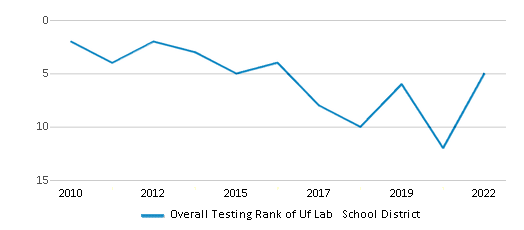
Math Test Scores (% Proficient)
67%
52%
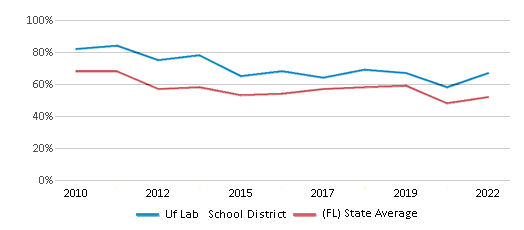
Reading/Language Arts Test Scores (% Proficient)
64%
52%
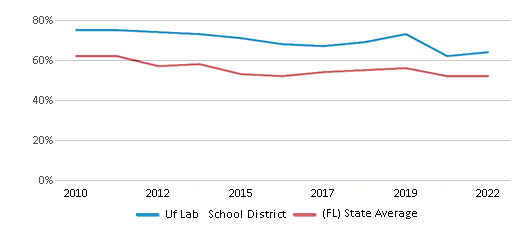
Science Test Scores (% Proficient)
65%
52%
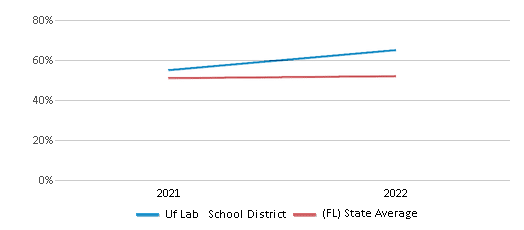
Graduation Rate
≥95%
87%
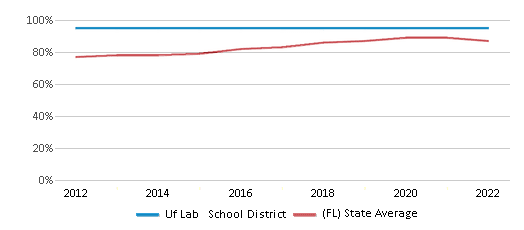
Students by Ethnicity:
Diversity Score
0.72
0.71
# American Indian Students
n/a
5,108 Students
% American Indian Students
n/a
n/a
# Asian Students
50 Students
57,983 Students
% Asian Students
4%
3%
# Hispanic Students
327 Students
757,879 Students
% Hispanic Students
24%
37%
# Black Students
290 Students
426,370 Students
% Black Students
22%
21%
# White Students
563 Students
697,092 Students
% White Students
42%
34%
# Hawaiian Students
n/a
3,394 Students
% Hawaiian Students
n/a
n/a
# Two or more races Students
110 Students
90,203 Students
% of Two or more races Students
8%
5%
Students by Grade:
# Students in PK Grade:
-
60,744
# Students in K Grade:
60
195,094
# Students in 1st Grade:
60
204,872
# Students in 2nd Grade:
60
211,537
# Students in 3rd Grade:
59
217,908
# Students in 4th Grade:
72
214,300
# Students in 5th Grade:
72
205,644
# Students in 6th Grade:
146
210,929
# Students in 7th Grade:
142
214,610
# Students in 8th Grade:
144
209,847
# Students in 9th Grade:
143
24,319
# Students in 10th Grade:
129
24,087
# Students in 11th Grade:
128
21,774
# Students in 12th Grade:
125
22,364
# Ungraded Students:
-
-
Best Uf Lab School District Public Elementary Schools (2025)
School
(Math and Reading Proficiency)
(Math and Reading Proficiency)
Location
Grades
Students
Rank: #11.
P.k. Yonge Developmental Research School
(Math: 67% | Reading: 64%)
Rank:
Rank:
8/
Top 30%10
1200 Sw 6th St
Gainesville, FL 32601
(352) 392-1554
Gainesville, FL 32601
(352) 392-1554
Grades: K-12
| 1,340 students
Rank: n/an/a
1200 Sw 6th St
Gainesville, FL 32601
(352) 392-1554
Gainesville, FL 32601
(352) 392-1554
Grades: 6-12
| n/a students
Recent Articles

Year-Round Or Traditional Schedule?
Which is more appropriate for your child? A year-round attendance schedule or traditional schedule? We look at the pros and cons.

Why You Should Encourage Your Child to Join a Sports Team
Participating in team sports has a great many benefits for children, there is no doubt. In this article you will learn what those benefits are.

White Students are Now the Minority in U.S. Public Schools
Increasing birth rates among immigrant families from Asia and Central and South America, combined with lower birth rates among white families, means that for the first time in history, public school students in the United States are majority-minority. This shift in demographics poses difficulties for schools as they work to accommodate children of varying language abilities and socio-economic backgrounds.





